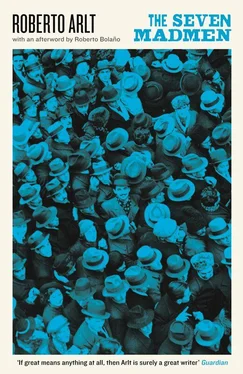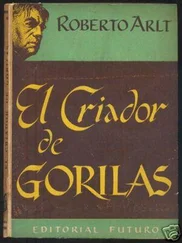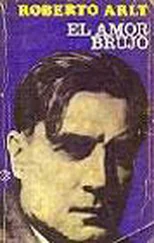At other times, Erdosain recalled moments when he knew beforehand what was going to happen to him, as he had told the Captain that fateful night. He felt a confused sense of dismay, a sense of lying in wait for reality in a way that now led him to say to himself: “I was right; I knew all the time.”
He remembered how one night he had been talking to Elsa and she, in a moment of sincerity, had confessed that if she had not already been married she would have stayed single and taken a lover instead.
Erdosain asked her:
“D’you mean it?”
Elsa replied harshly from the other bed:
“Yes, of course, I’d have taken a lover … what’s the point in getting married?”
Erdosain felt a strange deathly silence creeping over him, laid alongside his prostrate body like a coffin. Perhaps it was at that moment that all the unconscious love a man feels for a woman was destroyed in him, freeing him to face terrible situations that he would otherwise have been unable to cope with. He felt he was deep inside a tomb, that he would never again see the light of day, while in the black silence that filled the room, the phantoms his wife’s voice had summoned floated up before him.
Later, seeking to explain that episode, he recalled he had lain motionless on his bed, afraid any movement he made might tip over this immense unhappiness constantly pressing his horizontal frame up against merciless despair.
His heart was pounding. Each time it contracted, he felt he had to push up the weight of a slippery mass of mud. It was useless for him to try to reach up to grasp the sunlight far above. His wife’s voice still echoed in his ears:
“I would never have married. I would have taken a lover.”
And those few words, which had taken no more than a couple of seconds to utter, would stay with him for the rest of his life. He clamped his eyes shut. The words would be with him all his life, swelling inside him like a malignant growth. His teeth grated. He wanted to suffer still more, to exhaust himself in pain, to bleed himself dry in a slow dripping of anguish. Stiff as a corpse in its shroud, his hands stretched along his thighs. Head locked forward, not daring to breathe, he asked in a rasping whisper:
“And would you have loved him?”
“What for? … Who knows? … oh, and yes, if he was good to me, why not?”
“Where would you have met? They wouldn’t have allowed that kind of thing in your house.”
“In some hotel or other.”
“Ah!”
They fell silent, but walled in his unhappiness, Erdosain could already picture her, walking along the pavement of a street as stony as a river-bed. A dark veil covered half her face, as she walked with rapid, sure steps to the place her chosen desire was leading her. Seeking only to extinguish the last remaining glimmer of hope, Erdosain went on, a feigned smile on his face invisible to her in the darkness. He spoke softly so that she would not notice his lips quaking with rage:
“See how nice it is in a marriage to be able to talk about everything like brother and sister? But tell me, would you have stripped off in front of him?”
“Don’t talk nonsense!”
“No, just tell me: would you have stripped off?”
“Yes … of course! I couldn’t stay dressed, could I?”
Erdosain could not have been more rigid if someone had split his spine with an axe. His throat became as parched as if he had swallowed a mouthful of fire. His heart had almost ceased to beat, and a fog poured from his brain and out of his eyes. He was falling through silence and darkness, floating slowly down into the void while the paralysed block of his flesh only continued to exist in order to register still more deeply the imprint of pain. He did not say a word, though he would have liked to burst out in sobs, to have knelt in front of someone, to get up at that very instant, get dressed, leave the house and go and sleep in some doorway, or on the outskirts of some unknown city.
In his fury, Erdosain finally blurted out:
“Don’t you realise … don’t you realise how terrible what you’ve said is? I ought to kill you! What a bitch you are! I ought to kill you, I really should! Don’t you realise?”
“What’s the matter with you? Have you gone crazy?”
“You’ve ruined my life. Now I know why you never gave yourself to me, why you’ve forced me to masturbate. Yes, that too! You’ve turned me into a rag doll. I ought to kill you. Anyone could come up to me and spit in my face. Don’t you realise? And while I’m stealing and swindling and suffering for you, you … yes, that’s what you’re thinking of. Thinking you would have given yourself to a good man! Don’t you realise? A good man … a good man!”
“Have you gone crazy?”
Erdosain was throwing on his clothes.
“Where are you going?”
Erdosain struggled into his overcoat, then leaning over his wife’s bed, he shouted:
“You want to know where I’m going? I’m going to a brothel, to catch a dose of syphilis!”
The chronicler of this story would not risk any definition of Erdosain; the misfortunes in his life were so great that all the disasters he was later to cause in league with the Astrologer could possibly be explained by the traumas he suffered during his marriage.
Even when I read over Erdosain’s confessions once more, I can scarcely believe I had to listen to him baring his soul in such a terrifying way, so overcome by anguish he seemed free from all sense of shame.
I remember it well. During the three days he was holed up in my house, he told me everything.
We would meet in a huge, dimly lit room almost bare of furniture. Erdosain would sit perched on the edge of the seat, slumped forward with his elbows on his knees and his face hidden behind his hands. All the time, he stared down at the floor.
He spoke in a monotone, without breaking off, as if he were reciting a lesson etched into the surface of his shadowy consciousness at thousands of pounds’ pressure. Whatever he was talking about, his voice did not vary in the slightest, but kept the steady methodical beat of a pendulum.
If I interrupted him, he did not get annoyed, but began again from the beginning, adding the details I requested, never once raising his head from staring at the floor, his elbows clamped to his knees. He spoke slowly because of the immense attention he paid to each detail, intent above all on dispelling any confusion.
He piled horror on horror without a trace of emotion. He knew he was going to die, that man’s justice was ruthlessly pursuing him, and yet there he was, revolver in pocket, elbows on knees, face hidden behind his hands, staring at the dusty, empty room, and talking without a trace of emotion.
In just a few days he had grown extraordinarily thin. His sallow skin stretched taut over the flat bones of his face gave him a consumptive look. Later on, the autopsy confirmed that the illness was already ravaging him.
The second day he was in my house he told me:
“Before I married, I used to be horrified at the thought of fornication. To my mind, a man married a woman simply to be with her always, to enjoy the pleasure of seeing one another the whole time; to talk to each other, express love through one’s eyes, words and smiles. It’s true I thought that way when I was very young, but when I got engaged to Elsa I felt the need to renew my faith in these things.”
He talked and talked.
Erdosain said he never even kissed Elsa, because he was content to let the vertigo of loving her grip his throat, and also because he believed that “one should not kiss a young lady”. So he converted a craving of his flesh into something spiritual.
“We never addressed each other in a familiar manner either, because I liked the distance that a formal way of speaking created between us. I also thought one should not be too familiar with a young lady. No, don’t laugh. To my mind, a ‘young lady’ was the authentic expression of all that is pure, perfect and innocent. Next to her it was not desire I felt, but the stirrings of a wonderful ecstasy that filled my eyes with tears. And I was happy to suffer for my love, unaware of the real goal of my desire, truly believing it was a spiritual passion rather than a terrible bodily upheaval that made me a willing slave to her cool, level gaze, that searching gaze which slowly penetrated the most tumultuous layers of my spirit.”
Читать дальше











